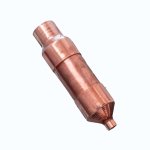
- Call Today: (208) 462- 0626
- Hours: 8am-4pm PST MON-FRI
Cutting-Edge Natural Filtration for Clean Water Solutions Worldwide
Cutting-Edge Natural Filtration for Clean Water Solutions Worldwide

What Is Reverse Osmosis?
Reverse osmosis is a filtration method that forces water through a semi-permeable membrane to remove contaminants. While this process is highly effective at reducing a wide range of impurities, including heavy metals, fluoride, and nitrates, it can also remove beneficial minerals like calcium and magnesium from your water. These minerals are important for health and can contribute to better-tasting water.
Additionally, RO systems typically produce wastewater during the filtration process. For every gallon of purified water, several gallons may be flushed away, which can be a concern in areas where water conservation is important.
Why Greenfield Water Solutions Prefers Natural Filtration
At Greenfield Water Solutions, we believe that water filtration should balance contaminant reduction with the retention of beneficial minerals. Our filtration systems, including kitchen point-of-use and gravity feed systems and filters, are designed to address common contaminants—such as heavy metals, chlorine, volatile organic compounds (VOCs), and microplastics—without depleting your water of its natural, health-promoting properties.
Mineral Retention and Water Health
One of the key reasons we focus on natural filtration is that it allows essential minerals to remain your water. Calcium, magnesium, and other minerals found naturally in water can play a role in supporting overall health. By choosing filtration systems that reduce harmful substances while retaining these beneficial elements, we provide you with healthier, better-tasting water.
Our systems also minimize waste. Unlike RO systems, which discard large amounts of water during the filtration process, our natural filtration methods use materials like activated carbon and ceramics to reduce contaminants without excessive water loss.
Sustainability and Eco-Conscious Solutions
Another reason we’ve chosen natural filtration methods is their alignment with our commitment to sustainability. RO systems, while effective at reducing contaminants, often require more energy and resources due to the waste produced. At Greenfield Water Solutions, we prioritize eco-friendly options that minimize environmental impact while still delivering high-quality water.
A Balanced Perspective
It’s important to note that we’re not suggesting that reverse osmosis is a poor choice. In certain situations, such as areas with high levels of specific contaminants, RO may be a necessary solution. However, for most households, we believe that natural filtration offers a balanced and sustainable approach to improving water quality. Our focus is on providing filtration systems that reduce contaminants while maintaining the natural integrity of the water you drink.
Conclusion
At Greenfield Water Solutions, we offer filtration systems that reflect our commitment to health, sustainability, and balance. Our natural filtration methods reduce contaminants while retaining essential minerals—and even offer the option to enrich your water with additional beneficial minerals. This approach provides a healthier, eco-conscious alternative to reverse osmosis. We believe clean, healthy water should be both effective and environmentally responsible, and our filtration systems are designed with that principle in mind.
Copyright © 2025 Greenfield Water Solutions - All Rights Reserved. Site by Driven Web Services